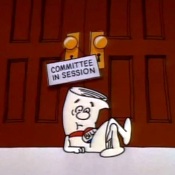Any vestiges of a Republic “of, by, and for the people” as
President Lincoln famously proclaimed, ceased at that point since it placed
elections in the hands of the highest bidder and effectively removed any
competition between Wall Street and unions, but between the wealthy elite and ordinary citizens.
We’ve also taken a look at partisan gerrymandering and
unlimited term limits which has virtually ensured that the two corporate owned parties---the
Democrats and Republicans---maintain a lock of the system. Partisan gerrymandering
as allowed them to redraw congressional districts to their advantage (and
basically permitting them to “choose” their voters instead of the other way
around).
Unlimited term limits gives them a virtual unhindered lock
on their seat in Congress regardless of how low their approval rating is (the
same can be said for federally appointed judges, including the Supreme Court). Approval
ratings for Congress are often in the low 30% range (it’s been as low as 9%),
and yet Congress still has a 97% reelection rate.
Can you imagine bombing every employee evaluation by your boss,
consistently getting customer reviews, routinely going over budget, and keeping
your job? How about even allowing you to decide on your own pay raises? Well, in Congress you can.
One tool used is requiring 10x more signatures on ballot
application or limiting the timeframe to obtain the signatures, as well as
indirectly collude with the media to keep them out of debates (especially at
the federal level), limiting “equal time” public access, and the perpetual
belittling of third party and Independent candidates.
Finally, adding salt to the wound, is legislation mandating
that all taxpayers pay for the primaries of the Democrats and
Republicans, irrespective of their registration, but despite paying, you aren’t permitted the opportunity to participate.
Imagine going out to eat. But, before you can order, you’re required to buy two
dinners for someone else, and you don’t have any say in it. Why? Because that’s
the restaurant rules, which, by the way, were written by the people whose
dinners you’re paying for. Is that fair?
Of course not! In politics, it’s called taxation without representation and
that’s what you have in closed primary states.
Now, let’s say you’re a registered member of the Libertarian
or Green party (the third and fourth largest political parties respectively in
the U.S.). Despite belonging to an official party, you are still obligated to pay for the primary
of the Democrat and Republican parties. However, nothing goes to your party.
Not a dime.
In fact, to keep your party going, you have to pay out of
pocket if you want to support it. Finally,
if you’re a registered Independent (the nation’s largest political bloc), you
face the same problem. Not only are you
prohibited from participating, you are being forced to financially support your political opponents!
Everyone is familiar with Tesla, thanks to Elon Musk, the
current head of DOGE—the Department of Government Efficiency---whose job is to
snoop around and file government “bad actors” and financial malfeasance of
taxpayer’s money. But did you know that Tesla, which is valued at $41 trillion
dollars, reported earning $2.3 billion dollars in 2024, paid zero dollars in
federal taxes? That’s right. Nada. As an aside, the average American family pays
roughly 14% of their income on taxes.
Over the past three years, the auto manufacturer earned $10.8 billion dollars and yet managed to pay
just $48 million in federal taxes. That works out to be a corporate tax rate of
0.4% (the statutory corporate tax rate is 21%). But it was more than just
clever accounting involved. Congress actually passed legislation giving Tesla a
tax break which saved them some $2.4 billion dollars.
Meanwhile, according to CBS, Elon Musk donated $277 million
dollars to the Trump campaign in 2024 through his political action committee, “America
PAC”. He also donated $10 million to the
Senate Leadership Fund, which backs Republican Senators. He also gave $3
million dollars to MAHA Alliance PAC, which is associated with Robert F.
Kennedy Jr. I’d say that’s not a bad
return on his investment.
In addition, 3M and Airbnb paid zero federal income taxes in
2024. Cisco, a high technology specializing in AI infrastructure, and
networking company (reputedly also the second most valuable company in America)
paid nothing in federal taxes either despite $2.7 billion dollars in profit in
2024. In fact, 10% of the S&P 500 companies paid nothing in federal taxes.
The Democratic Senatorial Campaign Committee got $62,543
while the Democratic Congressional Campaign Committee picked up $50,973 in
donations. The National Republican Senatorial
Committee was given $42,947 (it should be noted that between this and Trump,
all other leading donations went to Democratic candidates or causes)
Cisco lobbying ranks 197th out of 9,200 company’s
who employ lobbying firms. Their lobbyists spent $3,270,000 in 2024, which is
up from 2023’s $2,790,000. 32 of their 43 lobbyists were previously government
employees. That’s 74.42%. In 2023, they employed 34 lobbyists. 84.29% were
former government employees (elected, appointed, or hired).
When it comes to donations from 3M, the same hold true about
top executives donating. 64.40% of all donations went to Democratic candidates,
organizations, or causes. Republicans got 35.60%. Interestingly, 74.86% of incumbents
were supported compared to just 25.14% of challengers. Kamala Harris was the
top dollar among candidate, picking up 105,639 dollars. Donald Trump received just over $21,000 while
the conservative oriented “Never Back Down, Inc” received $150,000 in
donations.
Airbnb’s top executive donors gave Kamala Harris the most.
$224,995 went to her campaign with only Maryland’s Future, a conservative
outfit, picking any money for the right of center crowd. They received $25,000.
Of note, $43,050 went to the Libertarian Party’s National Committee . 93.92% of
all donations went to candidates compared to just 6.08% that went to political
action committees.
In terms of lobbying, Airbnb spent $940,000 in 2024, which is down from $1,030,000 in 2023. They employed 22 lobbyists in 2024, of which 68.19% held government jobs previously (elected, appointed, or hired).
General Electric earned close to $7 billion dollars in 2023
and not only didn’t pay any federal taxes, they actually got a refund of $423
million dollars! T-Mobile paid 0.4% in federal taxes yet bought back $13
billion dollars of its own stock back in 2023, giving its shareholders a hefty
profit on their investment.
Top executives at GE gave Kamala Harris $159, 351. Trump received
$43,987. The DNC Services Corporation got $43,342 while the Democratic
Senatorial Campaign Committee picked up $32,369. The National Republican Senatorial
Committee got $20,527. The Democratic Congressional Campaign Committee took in $19,931
in donations from GE executives.
The overall total donated for the 2024 election cycle was
$1,139,136. GE lobbyists “invested” $3.570,000 in 2024. 44 of their 68
lobbyists (64.71%) previously held a government job as note above. In 2023, it was 71.23% of the 73 lobbyists
they employed.
Meta (which owns Facebook) spent $20 billion dollars on
stock buyback in 2023, which was four times more than they paid in federal
taxes. General Motors spent $11 billion dollars on stock buybacks, which was 40
times more than they paid in federal taxes.
These are just a smattering of companies who pay little or
no federal taxes. JP Morgan Chase for instance had an effective federal tax
rate of 5.9% in 2021 despite earnings of $48 billion. Microsoft ‘s effective
tax rate was 9.7 although its earning were $33.7 billion. Chevron’s was 1.8%
but earned profits of $9.5 billion, and the list goes on.
Of course, they take full advantage of whatever deductions
are available based on existing federal laws, and who can blame them? However,
it is noteworthy that many of key officers for these corporations have also
made substantial political contributions. In addition, many of their top
executives have received compensation greater than the amount of federal tax
their corporation pays.
What can we do? Frankly nothing as long as Citizens United
remains in place. However, Congress could mandate a minimum tax based on anticipated
profits by independent auditors. They could also direct that no donations can
be made to candidates who have a direct relationship with their industry or
that all donations over $5000 per person must be directed to a blind trust, to
be dispersed by the party along with a percentage to be donated to a fund
available to third party and Independent candidates.
Rank choice voting would also be a good step for more fair elections as
would equal ballot access. Lastly, parties should be responsible for funding
their own primaries. Until then, the corporate takeover of elections will
continue.
Thank you for reading
"Another Opinion", the Op/Ed blog page for the "militant
middle". Here at "A/O" we truly value our readers. At
A/O we seek the facts as they exist, not partisan talking points. We
hope you find our articles informative and engaging. Comments are welcome,
provided they are not vulgar, insulting or demeaning. Another
Opinion is offered without charge and is directed toward all independent and
free-thinking individuals. We ask, however, that you "like" us on
whatever platform you found us on in order to keep our articles available for
free to others. Lastly, in order to keep costs down, we depend on passive
marketing, and therefore, depend on our readers to please forward our posts
along. Below you will find links to the sources we used in writing this
article. Thank you.
Elon Musk spent $277 million to back Trump and Republicancandidates
Telsa Reported Zero Federal Income Taxes on $2 Billion ofU.S. Income in 2024
Big Corporations Paid Shockingly Little Taxes Last Year
Nearly 10% Of S&P 500 Companies Paid No Tax----Including
Telsa
These 19 Fortune 100 Companies Paid next To Nothing---or
Nothing at All---in Taxes in 2021
Who Pays and Doesn’t Pay Federal Income Taxes in the U.S.?
How companies like Amazon, Nike, and FedEx avoid paying federaltaxes



























